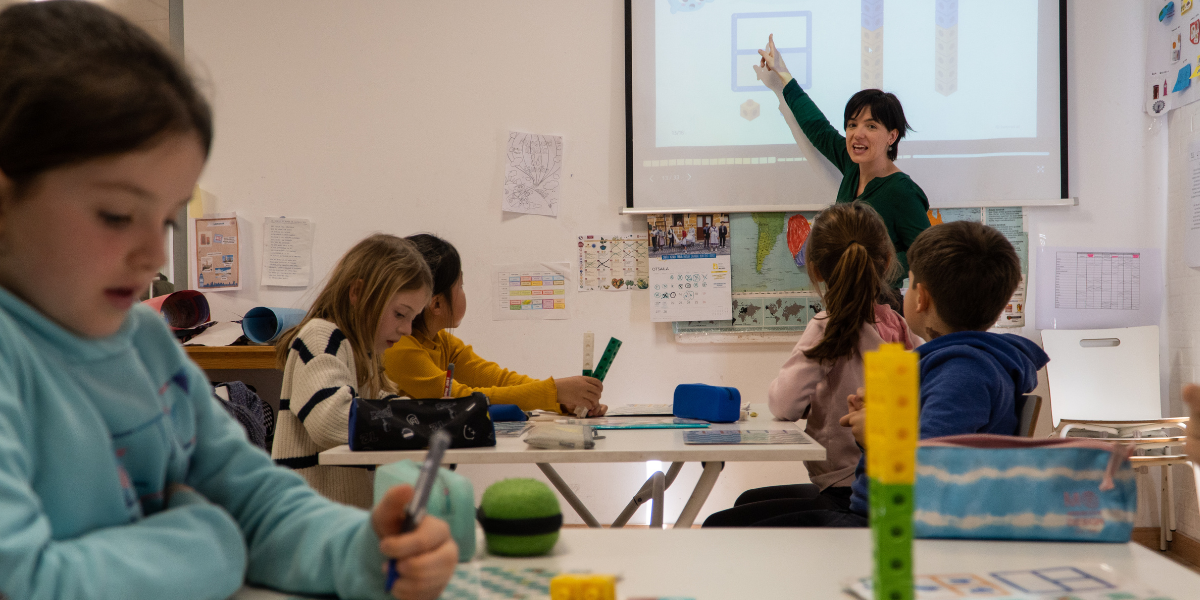With great power...
When university professors visit schools to give training sessions or to evaluate internship students, or when we meet with teachers at conferences and congresses, they often tell us that most university research does not reach them. It is a problem that many of us recognize, with a few exceptions, there is too great a gap between what is being researched in universities and what is happening in schools.
As Innovamat’s education team, we have always thought of, designed and written our activity proposals based on a powerful combination: the sum of years of experience in research and university teaching with decades of experience in the classroom. In other words, we start from what the research tells us and marry it with our experience over the years in elementary school or high school. At present, the team is made up of more than 40 teachers and professors from all school stages, from kindergarten to university. We read, we research, we discuss, we teach, we test and, in short, we learn together in an ecosystem that I consider privileged. This is where our educational resources come from, and this is why we often say that Innovamat is a project by teachers for teachers, based on research and on what we know works.
Comes great responsibility
But this alone is not enough. We have a responsibility that must go beyond that, we must be able to take advantage of the fact that we know and work together with the thousands of teachers who are taking our ideas to the classroom. In fact, we must be able to take advantage of this strength to close the circle, the implementation of our resources in the classroom contributes to the research from which we had started to create these same resources.
That is why we launched the Piramide Group last year, our own research group, linked to the Universitat Autònoma de Barcelona, the Universitat Rovira i Virgili, the Universitat de Barcelona and the D’EP Institut, which aims to carry out studies that contribute to the teaching of mathematics in general and to measure the impact of the Innovamat proposal in particular in order to improve it.
During the past school year, we concentrated our efforts on adding schools to the Vèrtex project, the cornerstone of the research we carry out at Pirámide. The Vèrtex schools are a community of schools that, regardless of whether they use Innovamat or not, have decided to be part of a leading group of schools committed to high scientific standards. From this point on, each center decides in which studies it wants to participate each year. These schools benefit directly from the research we do, through detailed reports for each study, which help them learn more about their students. Obviously, we learn too, we publish papers and communications at congresses, we rethink aspects in order to improve the Innovamat proposal, etc. And, in the end, it is a symbiosis from which the science of mathematic education also benefits.
Our studies in progress
We will now give you a glimpse of the various studies we conducted last year and are continuing this year in one way or another. Obviously, the Vèrtex schools receive exhaustive reports, and we are working to publish the most relevant findings in independent scientific journals, so do not expect to read them in this article, we want to be cautious and wait for independent peer review and validation. In any case, here is a summary of the objectives, in case you want to become a Vèrtex school and join the studies.
- Study of learning difficulties in mathematics
Regarding learning difficulties in mathematics, ARTIST (Automated Response To Intervention Study) aims to detect students at risk of having these difficulties early on and offer them an intervention with educational tools specifically designed for children with very low performance. You can read the main conclusions in this other blog article.
- Competence assessment studies
Regarding competency assessment and content acquisition, EQUAL (Estudi de QUaderns d’Avaluació Longitudinal) aims to analyze the results of the tests of the Basic Competencies assessment logbooks and the Kangaroo tests, to determine variables of influence. Elsewhere, the pilot study CB4 (Competencias Básicas de 4º) seeks to analyze the influencing factors on the learning of mathematics in fourth grade, which this year has become SMALL (Study of Mathematical Long-term Learning) to extend to more school years and stages.
- Studies of lack of interest and mathematical anxiety
Regarding the lack of interest and anxiety that many children experience in mathematics, we have carried out the MAI (Math Anxiety and Interest) pilot study, which analyzes the effect of the curricular proposal (especially Innovamat) on the emotional predisposition towards mathematics and, in particular, on mathematical anxiety; and the NAME (Narrative in the Classroom as Motivation for Students) pilot study to analyze the effect of the fictional narrative Sam’s Journey from the Innovamat proposal for middle school on mathematics anxiety, motivation and knowledge about the history of mathematics.
As you can see, despite being a small and emerging research group, we have an ideal ecosystem to research hand in hand with schools, and this allows us to do many different things. We are eager to share the results we find with you, but the rigorous nature of the research requires us to be calm, and to review each study, each methodology and each pilot test exhaustively. And, above all, to respect the rhythm of specialized scientific journals. In any case, as soon as we can, we will give it the diffusion it deserves!






